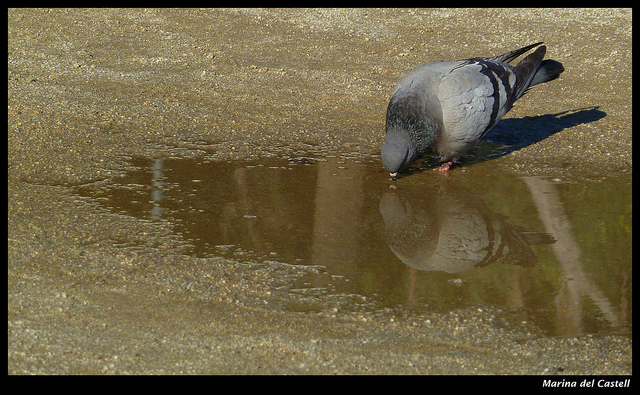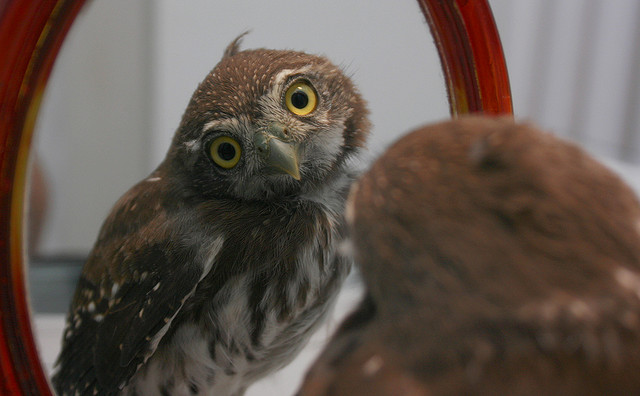Reflexive pronouns in Modern Greek Posted by Ourania on Jul 16, 2014 in Grammar
If you have already come accross the reflexive pronouns (αυτοπαθείς αντωνυμίες, aftopathees antonimies), this means that you are at an intemediate level. Well done! You can take a look at this article if you’re in the mood for a quick review.
The reflexive pronouns are formed by the noun «εαυτός» (eaftos) which means “self” and the weak types of the personal pronoun.
- They are used when the action of the subject goes back to the subject itself.
- They are used at the genitive and the accusative case (γενική και αιτιατική).
E.g. Η Στέλλα περιέγραψε τον εαυτό της. (Ee Stella periegrapse ton eafto tis)
Stella described herself.
- They can be used at the nominative case (ονομαστική) emphatically.
E.g. Η Στέλλα κατηγορεί τους άλλους αλλά μόνο ο εαυτός της φταίει. (Ee Stella kateegoree tous alous ala mono o eaftos tees ftaiee).
Sophia blames the others but it’s only herself to blame.
Αυτοπαθείς αντωνυμίες
Ενικός αριθμός (enikos arithmos) Singular
Gen:Του εαυτού μου (tou eaftou mou) myself
Acc:Τον εαυτό μου (ton eafto mou) myself
Gen:Του εαυτού σου (tou eaftou sou) yourself
Acc: Τον εαυτό σου (ton eafto sou) yourself
Gen: Του εαυτού του (tou eaftou tou) himself, itself
Acc: Τον εαυτό του (ton eafto tou) himself, itself
Gen: Του εαυτού της (tou eaftou tees) herself
Acc: Τον εαυτό της (ton eafto tees) herself
Πληθυντικός αριθμός (pleetheenteekos areethmos) Plural
Gen:Του εαυτού μας / των εαυτών μας (tou eaftou mas / ton eafton mas) ourself /ourselves
Acc: Τον εαυτό μας / τους εαυτούς μας (ton eafto mas / tous eaftous mas) ourself / ourselves
Gen: Του εαυτού σας / των εαυτών σας (tou eaftou sas / ton eafton sas) yourself / yourselves
Acc: Τον εαυτό σας / τους εαυτούς σας (ton eafto sas / tous eaftous sas) yourself / yourselves
Gen: Του εαυτού τους / των εαυτών τους (tou eaftou tous / ton eafton tous) themself/ themselves
Acc: Τον εαυτό τους/ τους εαυτούς τους (ton eafto tous / tous eaftous tous) themself / themselves
Μερικά παραδείγματα (The examples are translated directly)
Δεν προσέχω τον εαυτό μου. (Den proseho ton eafto mou)
I don’t look after myself.
Η Σοφία θεωρεί τον εαυτό της υπεύθυνο για το ατύχημα. (Ee Sophia theoree ton eafto tees eepeftheeno gia to ateeheema)
Sophia considers herself responsible for the accident .
Γιατί δουλεύεις τόσο πολύ; Πρέπει να βρεις χρόνο για τον εαυτό σου! (Giatee douleveis toso pole? Prepei na vrees hrono gia ton eafto sou)
Why do you work so much? You have to find time for yourself.
Η Άννα και ο Κώστας σκέφτονται πρώτα τα παιδιά τους και μετά τον εαυτό τους. (Ee Anna kai o Kostas skeftontai prota ta paidia tous kai meta ton eafto tous)
Anna and Costas think of their children first and after of themsef.
Να λυπάστε τον εαυτό σας, όχι εμάς. (Na leepaste ton eafto sas kai ohee emas)
You should be sorry of yourselves and not of us.
Πρέπει να μιλήσουμε για τον εαυτό μας. (Prepee na meeleesoume gia ton eafto mas)
We have to talk about ourself.
Source:
http://www2.media.uoa.gr/language/grammar/details.php?id=90
http://www.greek-language.gr/greekLang/ancient_greek/tools/composition/page_019.html
To avoid any technical misunderstandings that might arise, please note that:
- this blog does not substitute a grammar book.
- it’s impossible to cover all the aspects of a topic related to grammar, vocabulary and culture in a limited amount of words. Therefore, only specific parts of an aspect can be discussed.
Please, feel free to leave your comments at the end of the post or on the Facebook page. Ευχαριστώ!

Build vocabulary, practice pronunciation, and more with Transparent Language Online. Available anytime, anywhere, on any device.
About the Author: Ourania
Ourania lives in Athens. She holds a degree in French Literature and a Master’s degree in Special Education for Children. Since 2008, she has been teaching Greek to foreigners.






Comments:
David Becker:
Hello Ourania,
I spent a month in Athens and have also visited the island of Corfu….many years ago.
I had a class in Koine Greek…also many years ago. I am trying to understand the sentence structure of 1 Peter 4:7-10. Do you do anything in this form of Greek? Would you be willing to help me diagram these sentences? I can explain more in the email, if you are interested.
Thanks,
David Becker
Decorah, IA (USA)